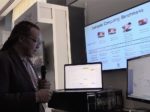In this guest article, our friends at Intel discuss how benchmarks show key workloads average 31% better on Intel Xeon Platinum 9282 than AMD EYPC “Rome” 7742. Intel analysis provides strong evidence that the 2nd Generation Intel Xeon Scalable Processor (Cascade Lake “CLX”) architecture provides dramatic performance for real-world workloads. An impressive array of benchmarks shows 2S systems built with Intel’s 56 core processors (Intel Xeon Platinum 9282 processor) solidly ahead of systems built with AMD’s 64 core processors (AMD EYPC 7742).
2nd Generation Intel® Xeon® Scalable Processors Demonstrate Amazing HPC Performance
Department of Energy to Showcase World-Leading Science at SC19
The DOE’s national laboratories will be showcased at SC19 next week in Denver, CO. “Computational scientists from DOE laboratories have been involved in the conference since it began in 1988 and this year’s event is no different. Experts from the 17 national laboratories will be sharing a booth featuring speakers, presentations, demonstrations, discussions, and simulations. DOE booth #925 will also feature a display of high performance computing artifacts from past, present and future systems. Lab experts will also contribute to the SC19 conference program by leading tutorials, presenting technical papers, speaking at workshops, leading birds-of-a-feather discussions, and sharing ideas in panel discussions.”
Accelerate Big Data and HPC applications with FPGAs using JupyterHub
Today InAccel annnounced that it has integrated JupyterHub into the company’s adaptive acceleration platform for FPGAs. InAccel provides an FPGA resource manager that allows the instant deployment, scaling and virtualization of FPGAs making easier than ever the utilization of FPGA clusters for applications like machine learning, data processing, data analytics and many more HPC workloads.
Optimizing in a Heterogeneous World is (Algorithms x Devices)
In this guest article, our friends at Intel discuss how CPUs prove better for some important Deep Learning. Here’s why, and keep your GPUs handy! Heterogeneous computing ushers in a world where we must consider permutations of algorithms and devices to find the best platform solution. No single device will win all the time, so we need to constantly assess our choices and assumptions.
Geoffrey C. Fox to receive Ken Kennedy Award at SC19
Today ACM/IEEE named Geoffrey C. Fox of Indiana University Bloomington as the recipient of the 2019 ACM-IEEE CS Ken Kennedy Award. “Fox was cited for foundational contributions to parallel computing methodology, algorithms and software, and data analysis, and their interfaces with broad classes of applications. The award will be presented at SC19 in Denver.”
Cortical.io Demonstrates Natural Language Understanding Inspired by Neuroscience
In this video, Cortical.io CEO Francisco Webber demonstrates how the company’s software running on Xilinx FPGAs breaks new ground in the field of natural language understanding (NLU). “Cortical.io delivers AI-based Natural Language Understanding solutions which are quicker and easier to implement and more capable than current approaches. The company’s patented approach enables enterprises to more effectively search, extract, annotate and analyze key information from any kind of unstructured text.”
Advancing Progress in Life Sciences
In this special guest feature from Scientific Computing World, Christian Marcazzo, VP and general manager at IDBS highlights trends in life sciences research and development. “As can be seen across most industries, organizations are increasingly moving systems and services to the cloud. For R&D firms, cloud-based software-as-a-service (SaaS) platforms that integrate all systems are the most effective way of overcoming legacy.”
Heterogeneous Computing: Long Live the CPU
In this guest article, our friends at Intel discuss how the company is investing in heterogeneous computing. Intel recently spoke about supporting heterogeneous computing with the catch phrase “One Size Does Not Fit All” in talking about software and Intel’s commitment to help programmers with oneAPI.
Sandia Research Project turns Big Data into real-time, actionable intelligence
Researchers at Sandia National Labs are leading a project to deliver actionable information from streaming data to decision makers. While social media, cameras, sensors and more generate huge amounts of data that can overwhelm analysts, the project looks to provide crucial insight in real time. “Actionable intelligence is the next level of data analysis where analysis is put into use for near-real-time decision-making. Success on this research will have a strong impact to many time-critical national security applications.”
Supercomputing and the Scientist: How HPC and Analytics are transforming experimental science
In this video from DataTech19, Debbie Bard from NERSC presents: Supercomputing and the scientist: How HPC and large-scale data analytics are transforming experimental science. “Debbie Bard leads the Data Science Engagement Group NERSC. NERSC is the mission supercomputing center for the USA Department of Energy, and supports over 7000 scientists and 700 projects with supercomputing needs.”












